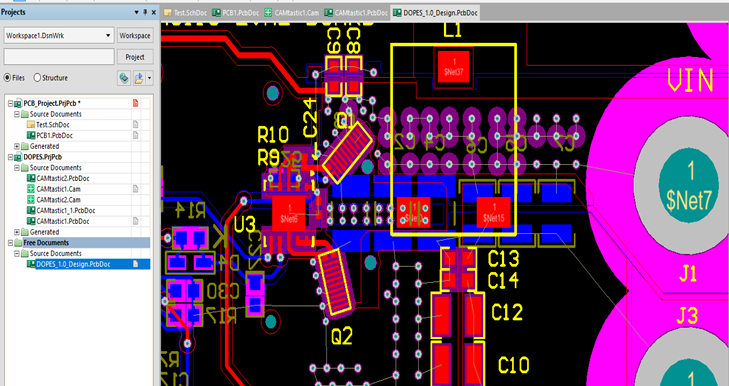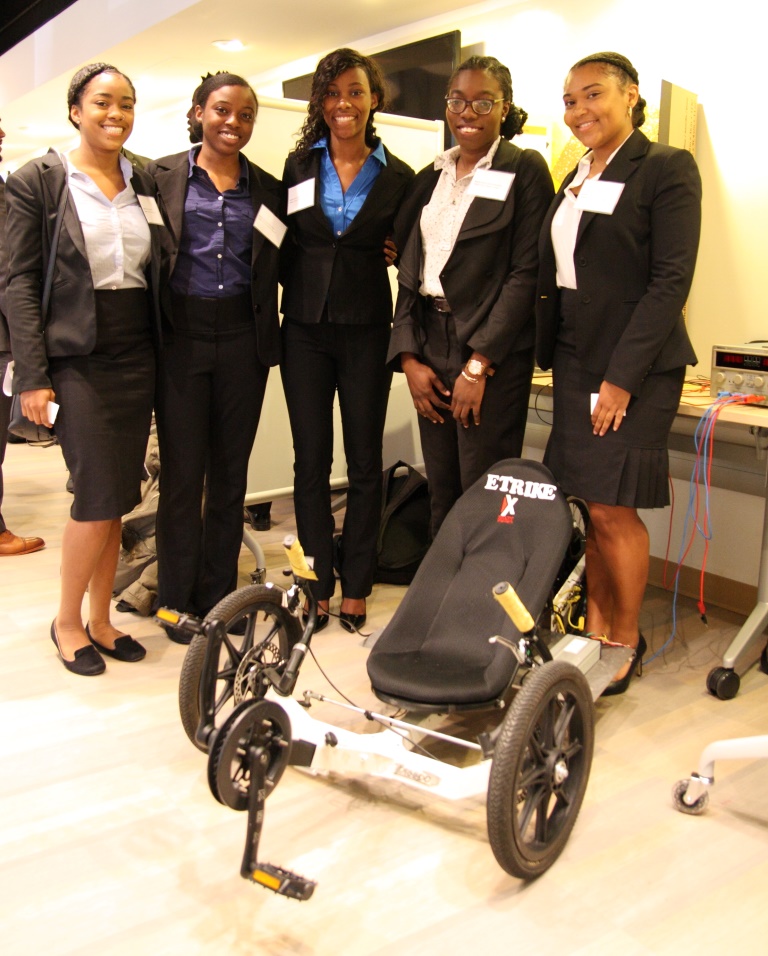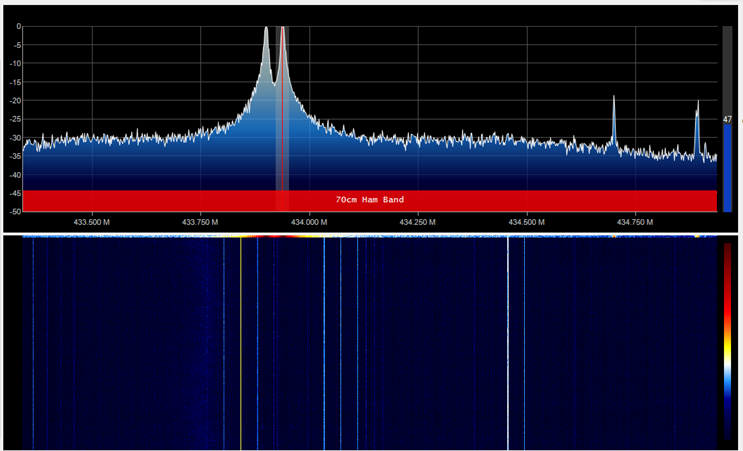
VIP Program at Howard University
Howard University
Washington, DC 20059
Coordinator: Dr. Charles Kim (CKIM@HOWARD.EDU)
This program is sponsored by The Leona M. and Harry B. Helmsley Charitable Trust as part of VIP Consortium Project (lead institution - Georgia Tech) to drive systemic reform of STEM education. Additional financial support, especially for Senior Design class projects, is generously made by Northrop Grumman Corp.
* How to Join?: If you want to join one of the teams below, contact (email) the Contact Person of the team.
Then fill out the Team Contract From (see Requirement below) and get approval from the advisor.
Any question can be directed to the VIP coordinator at ckim@howard.edu. Anyone, yeah anyone, can join.
Requirements for VIP Participants
| Requirements | Resources |
| 1. Approval
from Team Advisor (use Team Contract From -- See the right column) 2. Weekly Team Meeting Participation & Meeting Records 3. Participation in Semester-End Team Presentation (last week of the semester) 4. Submission of Survey (last week of each semester) 5. Submission of 1-minute video (or audio) clip of Elevator Pitch (Last week of the semester) |
* VIP
Team Contract Form
(pdf fillable), and a
Sample Contract * VIP Weekly Meeting Recording Form * VIP Survey (See below) at the end of the semester * Elevator Pitch & How to Prepare for it? * VIP Presentation Tips |
 (Survey is conducted at the end of each semester)
(Survey is conducted at the end of each semester)
HOWARD VIP Teams (2017-2018 Academic Year) Link to 2015-2016,2016-2017 Year
| Project Team | Advisor/Contact | Project Description | Team Info |
| SLatE8 | Advisor: Dr. Mohamed
Chouikha (Electrical Engineering) Contact: Vanessa Galani (Graduate Assistant) |
Sign Language
to English www.VIPatSlate8.html |
|
| Intruder |
Advisor:
Dr.
Hassan Salmani (Computer Engineering) Contact: Dr. Hassan Salmani (Computer Engineering) |
Hardware
Trojan Detection & Prevention for Health-Care Computer Systems www.VIPatIntruder.html |
|
| Wireless Sensor Network |
Advisor:
Dr.
Hassan Salmani (Computer Eng) Contact: Dr. Hassan Salmani (Computer Eng) |
Wireless
sensor network development for temperature sensing |
|
| HU Radio Telescope - Measuring the Galactic Rotation Curve |
Advisor:
Dr. Marcus Alfred
(Physics) Contact: Dr. Marcus Alfred (Physics) |
This project
will build a Radio Telescope following the MIT Haystack Radio Telescope
which was later extensively modified, and presently working, University
of Michigan version. EE, CpE, CS students for electronics, and ME
and CV students for machining, and other students from PHYS can
experience a great deal about this observational astronomy. VIPatHUscope.html |
|
| Terminator |
Advisor: Dr. Charles Kim
(Electrical Eng) Contact: Chidi Ekeocha(Graduate Assistant) |
Project Description:
Team Terminator’s new project focuses on developing a Chess playing
robot that relies on camera inputs to identify a chess board and a
mechanical arm to move the chess pieces and on machine learning
principles for ideal victory paths for the robot. This project aims to
cover various engineering fields and expose participants to long term
research in addition to applied and collaborative engineering
environments. While a robot that can play a game of chess on its own is
the end goal, for
this academic year, we will a robot which plays the game of Tic
Tac Toe.
In subsequent years, we will gradually
incorporate new features to achieve the end goal of building a robot
which plays chess. The project will have mechanical, electrical, and
programming aspects.
The
project team is under the supervision of Dr. Charles J. Kim (Team
Advisor) and the oversight of Chidi M. Ekeocha (Graduate assistant).
|
Previous Project (presently closed):This project aims to create and build inexpensive prosthetics by 3-D
printing which can be controlled by actions signals from the brain. www.VIPatProsthetics3.html |
| DOPES - "Diagnosis of Power Electronic Systems" |
Advisor: Dr. Charles Kim
(Electrical Eng) Contact: Ayotunde Odejayi(Graduate Assistant) |
This project
aims to build an Reliability Diagnosis System, using IR temperature and
GMR current sensors, for Power Electronics Systems which are popularly
used in mobile platforms such as aircraft, electric vehicles, and
off-road high power vehicles. www.VIPatDOPES.html |
|
|
Seismolator - "Building a magnetic levitation platform as an ideal
seismic isolator" Spin-off Project: Energy Dissipation Interface (Description and Presentation) |
Advisor: Dr. Claudia Marin (Civil
Eng) Technical Advisor: Dr. Charles Kim (Electrical Eng) Contact: Sola Famakin (Graduate Assistant) and Mehdi Rezaee |
Commonly used
seismic isolators at the base of buildings try to disconnect the
buildings from the ground to limit the transmission of damaging effects
of earthquakes to the building like hanging the structure on the air.
The link (LINK)
compares the responses of a seismically isolated and a non-isolated building.
An ideal seismic isolator will keep the isolated object floating on the air to avoid contact with the shaking ground, then the isolated body won't experience the dynamic effects of the earthquake. The mission of this project is to build a prototype magnetic levitation system to float an object of 1 lb weight to isolate it from a shake.  www.VIPatSeismo.html |
|
| Thru-Wall - "Seeing Through-Wall using Software Defined Devices" | Advisor:
Dr. Danda Rawat
(Computer Science) Contact: Dr. Danda Rawat (Computer Science) |
This project aims to develop methods to detect reflected signals for seeing through-wall. This project, if successful, could help to find/detect/see somebody in the closed room without seeing the person physically (e.g., trapped person detection inside a collapsed building, active shooter inside a closed room/building, cancer tumor detection, elderly monitoring, etc). Interested student should contact the contact person listed. | |
| AutoMoe - "Resilient Autonomous/self-Driving Cars: A prototype" | Advisor:
Dr. Danda Rawat
(Computer Science) Contact: Dr. Danda Rawat (Computer Science) |
This project
aims to develop light weight cybersecurity schemes, privacy aware
communications, adaptive speed control, automatic braking, rerouting,
information sharing using wireless access technologies and display
vehicle's status information.  |
|
| CARS - "Cars Assuring Resilient Security" | Advisor: Dr. Gedare Bloom
(Computer Science) Contact: Habeeb Olufowobi (Graduate Assistant) |
This project investigates security protocols and mechanisms that
maintain safe operations for network-connected and autonomous automotive
vehicles. In particular, we propose a fail operational intrusion
detection system (FO-IDS) for vehicle networks. for vehicle networks that will consist of 2 main parts. 1) an
intrusion detection system, which can detect if an attack is performed
over the CAN network 2) a mechanism that transitions the system into a
fail-safe state in which critical function remain operational. |
|
| DESPITE - "Despite Exploits, Security via Provenance for IoT Endpoints" | Advisor:
Dr. Gedare Bloom
(Computer Science) Contact: Ebelechukwu Nwafor (Graduate Assistant |
This project investigates security for Internet of Things (IoT) applications by analyzing and mitigating exploitable vulnerabilities in the embedded systems used to monitor and control the Things. | |
| eTrike |
Advisor: Timothy Brown (Electrical
Eng) Contact: Timothy Brown(tbrown@howard.edu) |
 Restoration of a human-electric powered recumbent single seat tricycle - Design and build a battery pack and management system (BMS). |
|
| The EV 2.0 |
Advisor: Dr. Emmanuel
Glakpe (Mechanical Eng) Contact: David Quashie, Jr (Mechanical Eng) - UG Assistant |
The goal of this project is to turn a hybrid
General Motors EV 1 into an self-driving electric car.
|
|
| Bioinformatics- Analysis of Rare Mutations Associated with Mental Disorders |
Advisor: Dr.
Shaolei Teng (Biology) Contact: Kristodea Boadum (Biology) - (Graduate Assistant) |
This project aims to analyze the protein mutations in hundreds of
schizophrenia risk genes to better understand the pathogenesis of the
disease. We will investigate the effects of rare non-synonymous
mutations rare missense mutations in DISC1 Interactome genes on protein
structures and functions. We will apply the sequence-based machine
learning approaches to identify the disease-causing mutations, estimate
the effects of mutations on protein stability, and discover the rare
mutations involved in post translational modifications. We will utilize
protein homology modeling, energy computing and molecular dynamics
simulation approaches to analyze the effects of missense mutations on
protein structure, protein stability and protein-protein interaction.
Our goal is to discover the mutations that increase the risk of
schizophrenia in minority populations and improve guideline for the
treatment of patients with schizophrenia. Introductory 1-pager |
|
| Bioinformatics- Prediction of Protein Sumoylation Sites using Deep Learning |
Advisor: Dr.
Shaolei Teng (Biology) Contact: Adebiyi Sobitan |
This project aims to apply new machine learning approach for predicting
sumoylation sites from protein sequence information. We will apply the
sequence-based deep learning approaches to identify the functional
important sites involved in this post translational modification. We
will develop the web servers and databases and make the online tools
accessible to the research community. Introductory 1-pager |
|
| Bioinformatics- Prediction of Internal Ribosome Entry Site using Machine Learning Approaches |
Advisor:
Dr.
Shaolei Teng (Biology) Contact: Paul Olopade (Biology) - (Graduate Assistant) |
This project aims to predict the Internal Ribosome Entry Sites (IRES) using new machine learning approaches, We will apply deep learning, random forests and support vector machines to construct the models. The accurate classifiers will be used to develop a new web server for IRES prediction. | |
| HACK - Hardware and Hackers |
Advisor:
Dr.
Michaela E. Amoo (Computer Eng).
mamoo@howard.edu; Technical Advisor: Dr. Danda Rawat (Computer Science) Contact: Dr. Michaela Amoo |
This project's primary goal is to develop hardware based cybersecurity
solutions: In general, network accessible systems are susceptible to
malicious attacks or security breaches. The standard approach is to
tackle cybersecurity issues by examination of network traffic and
software-based security measures. This research will determine the
cybersecurity vulnerability of common system architectures
(application-specific, micro, and mu-processor), and build cybersecurity
solutions directly into hardware. Team participants will become
proficient in hardware design, ethical hacking, and cybersecurity.
Students are welcome from EE, CpE, CS, Mathematics, and all other
departments. Interested student should contact the contact person
listed.  |
|
| Deliveroid- A Delivery Robot |
Advisor:
Dr. Charles Kim
(Electrical Eng) Contact: Derrick Anang (Graduate Assistant) |
The long term goal of the project is to build a delivery robot which
performs errands between any two locations even in different floors of a building. A short term objective is to
build a 1st-gen robot which delivers to a location in the same floor.
Microcomputer coding, sensing, RFID or Wi-Fi and remote access, and
proximity detection would be integrated for the project. |